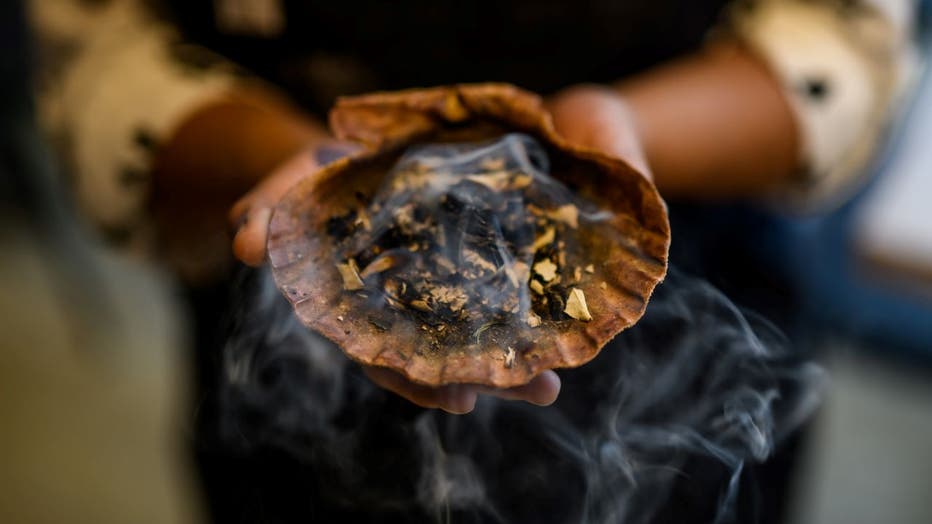Indigenous People's Day celebrations in Minnesota
MINNEAPOLIS (FOX 9) - Indigenous Peoples Day falls on a Monday this year, but celebrations occur all week. In most places, the holiday is still known as Columbus Day, but many use this day as an opportunity to celebrate America's first humans. Gov. Tim Walz also declared Oct. 11 as Indigenous People's Day in Minnesota.
Events celebrating Indigenous People's Day
Twin Cities:
- New Water Works Park at 333 1st St. S, Minneapolis
- Oct. 8 from 1 p.m. to 5 p.m.
The Owámni Falling Water Festival takes place on Saturday, Oct. 8, along the Mississippi River. Owámni is what the Dakota called the area at St. Anthony Falls. It means, "whirling or falling water" in the Dakota language.
This free and family-friendly festival offers art, music, and food from local groups. Hands-on art activities will also be available.
- Midtown Global Market:
- Oct. 9 from noon to 2 p.m.
Sean Sherman and Dana Sherman will be honored for their recent James Beard awards and presented with star quilts. Specialists from the Indigenous Food Lab will be at the market giving a food demonstration and offering samples of their tea and butter cookies. Spirit Boy Drum and Dance Crew will perform ceremonial drum and dance at the event.
An hour of free parking will be offered to anyone who purchases from a vendor at the event.
- Hennepin County Library
- Oct. 10
In celebration of Indigenous Peoples Day, a series of movies featuring Native filmmakers will be screened at the Minneapolis Central Library. Find the full schedule of films here. Throughout the month, performances of Star Turtle, a musical look at the Cherokee language. Find performances times and locations here.
Mankato:
- Various Locations
- Oct. 6-10
This celebration takes place across the week. The events begin with a film screening at 4 p.m. at the MSU Campus. The University will screen the film "Gather" on Thursday, with repeat screenings on Saturday and Sunday.
Friday's celebration will include food and live music at the HUB Food Park. The festivities culminate with a speech from Diane Wilson, the author of "Seedkeeper."
Duluth:
- 411 W 1st St., Duluth
- Oct. 10
This event is hosted by the Duluth Indigenous Commission. The 2022 theme is "why it's great to be Indigenous," and signs are encouraged.
Pipestone:
- 36 Reservation Ave., Pipestone
- Oct. 9
Pipestone National Monument will celebrate the holiday with a night of lights, music, and traditional dancing. Cider and hot cocoa will be available from the visitor center. This event is free, self-guided, and open to the public.
Museums, restaurants, and historical sites highlighting Indigenous history

A staff member carries burning sage through the dining room at Owamni by The Sioux Chef restaurant before service on Thursday, Nov. 11, 2021 in Minneapolis. (Stephen Maturen/Chicago Tribune/Tribune News Service via Getty Images) (Stephen Maturen/Chicago Tribune/Tribune News Service via Getty Images)
Minnesota History Center:
- 345 W. Kellogg Blvd., St. Paul
Our Home: Native Minnesota is currently a featured exhibit at the History Center. This exhibit highlights Native communities in Minnesota, including the Dakota and Ojibwe, and shares their stories, enduring presence, and deep connection to the land.
Jeffers Petroglyphs:
- 27160 County Road 2, Comfrey
Jeffers Petroglyphs is home to around 5,000 sacred rock carvings created by the ancestors of today's Native Americans. Explore the trails and tour the petroglyphs on Saturdays from 10 a.m. to 5 p.m.
Mille Lacs Indian Museum and Trading Post
- 43411 Oodena Dr., Onamia
This restored 1930s trading post is home to exhibits that tell the story of the Mille Lacs Band of Ojibwe. You can also participate in demonstrations and tours, and shop for locally made Native American arts and crafts.
Owamni
- 420 1st St. S, Minneapolis
This James Beard award-winning restaurant opened in the summer of 2021. Every dish at Owamni is created without wheat flour, dairy, cane sugar, black pepper as these ingredients were introduced to the continent after Europeans arrived. While reservations are difficult to get, the patio is first-come first-serve.

